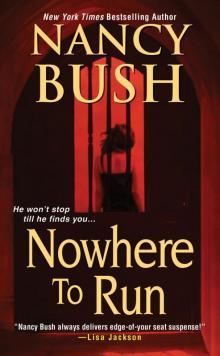- Home
- Bush, Nancy
Nowhere to Hide Page 9
Nowhere to Hide Read online
Page 9
“Yes . . .”
“She warned us all to lock our doors. Is that for real?”
“We don’t know enough yet.” September thought about bringing up her artwork, but decided against it for the moment. “We’re still investigating,” she added, then July was called by the foreman in charge of the harvest and September headed toward her car. She’d been toying with the idea of stopping in at Westerly Vale; she knew that Jake’s brother Colin and his wife had taken over the running of the vineyard and she thought maybe approaching them first might help warm her up for the interview with Jake.
But then . . . Jake himself had called out to her. Could that be mere coincidence? She’d recognized his voice immediately, and in mild shock she’d turned to meet him while strange sensations chased up and down her spine as she looked upon her long ago crush.
Jake Westerly. She’d sorta hoped he’d aged poorly. She’d sorta hoped that she would take one look at him and wonder what the big deal was. But no . . . one eyeful and she was thrown back to that May night among the vines with a skinny crescent moon riding overhead and the scent of loam and vines and strawberry and peach coolers hanging on the warm air. She’d lost her virginity right there and then, and though she’d never regretted it—hell, no, she’d cherished the memory—she did sometimes wish she’d just picked someone a little more emotionally available. Maybe even someone she could have had a relationship with of some kind. Sure, they’d been kids but sometimes those relationships had real weight and even lasted.
And then T.J. and his announcement that Jake had been looking for a virgin. She knew T.J. was a bastard, and you couldn’t believe half the things he said. Nicknaming Barbara “Bambi” sort of spoke for itself. But that said, it had still stung to hear his words.
So, yeah. She’d wanted Jake to be a dog, but he was still just as handsome, tall, lean, and athletic as ever, his hair still dark brown and maybe a little longer behind his ears, his cool, gray eyes lit with inner amusement as he gazed upon her.
He looked . . . good enough to eat, and it really pissed her off.
Now, she tried to review their conversation, but her mind kept circling around to the same two issues: 1) that he’d realized she’d been wondering about his involvement with Sheila, and 2) whether she’d seemed professional enough. She’d been so desperate for him to take her seriously, that she thought she might have come off a little too Joe Friday—just the facts, ma’am—when she really did want to just roll back the years and treat him as an old friend, even if he wasn’t one exactly. She’d been concentrating on seeming capable and successful and well, interesting. Yes . . . she’d wanted Jake Westerly to find her interesting.
So, sue me, she thought, annoyed with herself. It irked her to no end that inside she still hadn’t completely washed him out of her system. Even with him on the periphery of a murder investigation . . . or worse.
September got up from the chair, not liking her thoughts. She couldn’t let herself be blinded by her own attraction to him. That was reckless and dangerous. Still, he just didn’t seem the type to seduce and attack women. He was too easygoing. Too normal. Too involved with people, with humanity as a whole. She wasn’t exactly sure what his job was; she would check that out along with a lot of other things when she was back at the station. She had been avoiding driving the investigation at him for a number of reasons, one being she was too susceptible to him. Still.
Grinding her teeth together she headed back downstairs and through the kitchen to the cement stairs that led down into the basement. Flipping on the fluorescents, she looked around, but as she ducked beneath the low-beamed ceiling she saw only outdoor tools and gardening supplies. There wasn’t one cardboard box. Nothing paper except some bags of mulch. The place smelled faintly musty and the narrow windows were dirt-smeared. She doubted anyone but the gardener had been in the basement for years.
She would do another search of the attic, another day, though she was fast losing interest and energy for the task. And even if she succeeded in finding her old schoolwork, she wasn’t sure she’d learn anything from it.
Back upstairs, she was heading toward the front door when she heard a noise, the creak of a floorboard. Pausing, feeling the hair on the back of her neck rise, she called, “Rosamund? Dad . . . ?”
There was no answer, but the air felt different, in that way that sometimes meant that someone was near.
“I know you’re there,” she said calmly, even while her heartbeat escalated.
She waited, then felt a jolt of fear when a man suddenly emerged from the shadows.
“I didn’t think anyone was here,” Stefan Harmak said, eyeing her carefully. He’d been silently waiting somewhere in the dining room, beyond her sight.
“Good God, Stefan. You still have a key?” she asked a bit harshly. Verna’s son had always been a skulker, but it had been years since Verna was the reigning evil stepmother and Stefan had the run of the house.
“Yeah. Of course,” he answered.
Of course? “But you haven’t lived here for years.”
His answer was a shrug, and, as if losing interest in her, he sauntered off in the direction of the kitchen.
September and Auggie had gone to school with Stefan; he’d been several years behind them. But the last time September had seen him was at July’s birthday party at The Willows. Both he and his mother had shown up—uninvited—but there were enough other people around that July had simply waved off Rosamund and March’s suggestions that she should kick Verna and Stefan out.
“Who cares?” July had said with a shrug. She hadn’t wanted to spoil her good time and she’d been a little wine-drunk as well.
September hadn’t spoken to Stefan at the party, nor had she paid him much attention. She’d spent most of the time staying a couple of steps ahead of her father, who’d been, as ever, bent on learning information on Auggie. The war between Braden and his youngest son would never be mitigated by September or any of the other Raffertys. The only way they would get past it was by one or the other of them making a big concession . . . which was about as likely as the moon being made of green cheese.
“What are you doing here?” she asked Stefan. He had dark hair, a little unkempt, dark, penetrating eyes, and a stony expression. She didn’t think she’d ever seen him smile from joy.
“Just waiting.”
“For . . . Braden?”
“Mom told me to meet her here. She wants to talk to your dad about some stuff.” His gaze flicked past her, to the picture of Rosamund.
“Verna’s coming here tonight?”
Stefan nodded.
September wasn’t sure what to make of that, but she’d had enough of the house, her family, and now Stefan and Verna. She moved to the door and heard Stefan ask, “Wait. What are you doing here?”
“Looking for things,” she said as she slipped into the surprisingly warm evening air.
“Like what?” he demanded.
But the door was already shutting and automatically locking behind her. With a shiver sliding down her spine despite the heat, she hurried to her car.
Chapter 6
The Barn Door was aptly named with its red and white sliding door that led into a huge room with a loft overhead. The loft sported real hay bales, from the look of it, and a roughhewn bar that ran all along one side of the room, a smattering of wooden tables, and a small dance floor with a raised stage where wooden crates were upended for stools amid varying mics, amps, and assorted instruments. A row of overhead fans hanging on long stems from the rafters were whirling madly in an effort to keep the outside heat from suffocating the patrons. The fans were only marginally effective.
September walked in without paying a cover because it was still early for a Friday night. She chose a spot at the bar, and sat down, wearing only her sleeveless black T-shirt and black pants. No jacket, and therefore, no gun. She wanted to blend in as much as possible and had stopped by her apartment to change her shoes, eschewing the practical, clunky b
lack flats for sleek black boots with wooden heels. She’d brought a black messenger bag along as well, and now she lifted the strap over her head and searched around underneath the bar for a hook to hang it on. Failing that, she set the bag on the bar, effectively saving Sandler a seat at the same time.
“What’ll you have?” a blond, female bartender asked her, flipping a white cloth over her shoulder.
“Club soda with lime,” September answered. She was still working, or more accurately, working again, as stopping by the family home had been more of an off-hours thing, though she could undoubtedly argue that it was all in pursuit of the Do Unto Others killer and claim overtime. Didn’t matter. At this point she just wanted to find the psycho as soon as possible, whether she got paid for her efforts or not.
She was delivered her drink and then the bartender moved on. There was a male bartender as well, but he was much further down the bar, closer to the front door, and he wasn’t as young or ripped as Dom at Xavier’s, so September figured Sandler wouldn’t be pouring on the charm.
Gretchen had called September as she was driving back toward the station and said that she was getting ready to leave and to meet her at The Barn Door. She would fill September in on her reinterview with Emmy Decatur’s parents and they could ask questions of The Barn Door staff together.
September had received a call back from Deputy Danny Dalton, who’d caught her as she was leaving her apartment after the footwear exchange. Dalton hadn’t been all that thrilled to talk to her.
“I already gave you guys the file,” he said smartly. “Everything I learned was inside. I write a damn good report, Detective. You should see what you could’ve got.”
“I’m not denying the report,” September said. “I just wanted to get some impressions from you, if that’s possible. Anything you might have thought. An observation, or anomaly . . . anything.”
“It’s all in the report,” he said again, not giving an inch.
“Let me ask you a specific question,” she said, giving up the pretense of trying to keep up relations between county and the Laurelton PD. Dalton didn’t care, and neither did she. “Greg Dempsey suggested that his wife—his estranged wife, Sheila—was seeing other men. There was no mention of it in your report.”
“He never said anything to me.”
“From your impression of Dempsey, do you think he just made that up for us? Or, maybe he added it after he thought things over?”
“Dempsey’s a dickhead. I’ll go with made it up.”
“Maybe,” September answered, though she knew she was too personally involved to make that kind of judgment.
“Look, you want to get together and talk, I can do it. But everything I learned is in the report. I was pretty damn careful about getting it all down, especially when I heard you guys were taking over.”
“Okay, good,” September said, sensing an insult in there somewhere but not caring much. “If I need anything else, I’ve got your number.”
“Sure. You won’t though. It’s all in the report.”
That could be the epitaph on the man’s grave, September decided now, sipping at her soda. It was damn hot in the bar despite the fans. She thought about switching to a chilled glass of white wine, but then wine reminded her of The Willows and that reminded her of Jake Westerly and she decided to stick with soda.
Damn the man. He’d invaded her thoughts as much as he had in high school, and she’d thought she was way over caring a whit about Jake Westerly. She should be way over it. She really should.
Gretchen came in wearing what she’d started the day in: gray pants, a white blouse, and a gray jacket. She was still carrying her Glock at her hip and the expression on her face said: Don’t fuck with me.
Hmmm . . . September thought. Why was she looking so hard-nosed? A finger of guilt slid down her bag. Had Sandler learned about September’s relationship to Jake?
“God, I’m tired of assholes,” she said, grabbing the stool next to September and shoving her satchel out of the way.
“Who’s the asshole?” September asked.
“Thompkins. I asked him to check on Glenda Tripp’s employment and instead he checks with the lieutenant, like I’ve overstepped my bounds. He thought it had something to do with the Zuma case, I guess, and that’s not ours any longer.”
“What did D’Annibal say?”
“Told George to get the fuck on it . . . in nicer terms, of course.”
Lieutenant Aubrey D’Annibal was known for being put together in creased slacks, fresh dress shirts, shined shoes, tailored jackets, and his silvery hair was combed, clipped, and styled. His conversation rarely fell into expletives. Reading between the lines, September guessed he’d said something like, “Go ahead and do the research, Thompkins. It’s for the Do Unto Others case.”
“So, did George learn anything about Glenda?”
“Not really. Looks like a dead end as far as connecting Tripp to Dempsey. Tripp applied all over the city for a teaching job, and was finally given summer classes at Twin Oaks. She took the job because she needed the experience, but she got paid next to nothing. She was hoping to get on staff this fall, but well, we know it never happened.”
“Any staff members still there from when Sheila attended?”
“We can look into that when school opens Monday. For now, I need a drink.” She tried to catch the female bartender’s eyes, but she was busy with a group of cowboy types and it was the male bartender who caught Sandler’s raised hand and came down the bar to help them.
“What can I do for you?” he asked.
“Cranberry juice, a little lime and vodka.”
“Cosmo?”
“Whatever.”
As he turned away to get her drink, September asked her, “Did the Decaturs offer anything more?”
Gretchen shook her head. “Mostly it was more of the same. What a wonderful girl she was. What a bright light. They just want to talk about her, like the Schenks did about Sheila, and they do not want to even brush on Emmy’s murder and sexual assault. Remember Emmy’s coworker, Nadine, who said Emmy’s parents had kicked her out her junior year? That they didn’t care about her?”
“And you said, ‘Don’t believe it.’”
“Well, I was right on that one. The parents are really having trouble with her death. I did ask them what schools she went to. Brandyne Elementary and Junior High, and Rutherford High. Not Twin Oaks. Same district, different lineup.”
September made a “hmm” sound. She visualized the Decaturs from the time she and Gretchen had interviewed them at their home on Sycamore Street, which was on the opposite side of town from September’s Sunset Elementary, Sunset Junior High and Valley Sunset High. Emmy Decatur had attended schools in the same district, but hers didn’t funnel into Valley Sunset High like September’s, and since Sheila hadn’t stayed past sixth grade, she hadn’t attended either Brandyne Junior High or Rutherford High where Emmy had been until she dropped out. Rutherford High and Valley Sunset had long been rivals within the same district, and though a lot of students knew each other from sports, or family friends, or because they’d crossed from one high school to the next, a lot of them only knew their own classmates. It didn’t appear there was a connection between Emmy Decatur and Sheila Dempsey through their schools. They hadn’t attended the same elementary school and Sheila never made it to junior high or high school in the district where she might have met Emmy. If there was a connection between them, she and Gretchen needed to keep looking for it.
“Glenda Tripp went to a Portland school. Lincoln, maybe,” Gretchen said.
“Do you think the killer changed his m.o. with her?” September asked.
“Nah. It’s just like we’re thinking. He didn’t have time to move her body to a field. He kills them somewhere else and drops them off. He was interrupted. Does it seem to you he’s just targeting a type—athletic women with darker hair? It seems that way to me.” She slid a look at September.
“I know,” she said.
“I fit the part. But he picks them up outside of bars and he sent my artwork to the station, which is different, too.”
“All three vics lived in the Laurelton area, so maybe he’s from here.”
“If he did them all,” September said.
“Do you think it’s a question? I know we’re dancing around, keeping it from the public, keeping the feds from taking over before we know, but really?”
September locked eyes with her partner. “He did them all.”
Gretchen nodded once. “I agree. We’ll go on that assumption from here on out.”
“And I do think the killer’s the same person who sent me my artwork and the card with my age.”
“Okay.” She pressed her lips together. “Then it’s someone who knows you. Maybe he’s even lived here all his life. One of your classmates?”
“At least you didn’t say it was my family.” September drew a breath. “So, that’s how he has my artwork? Because he knows me and he’s saved it all these years and decided to send it to me now . . . ?”
“How’d he get access to your grade school project?” she asked, nodding, circling back to the same basic issue.
“I don’t know.” September shook her head. She didn’t believe for an instant that either her father or March could have sent that “bloody” artwork. Stefan was a possibility, she supposed, but he was an odd duck whose interests seemed more juvenile than alarming. He’d never had a girlfriend, or boyfriend, for that matter, that she knew of, and, since he’d never shown the least little bit of interest in moving out, she’d just kind of always thought of him as a Peter Pan type. If he had a job, she didn’t know what it was. And the killer wasn’t July, or either of the two stepmothers. Besides the fact that she just couldn’t imagine any of them as the killer, the three victims had all been sexually abused and unless somebody found irrefutable evidence to the contrary, September was sticking with the theory that their doer was male.
But for September, that meant that Gretchen had been right the first time: the killer was one of her classmates. Jake Westerly was a better candidate. He’d gone to second grade with her. He remembered the project. He knew Sheila.

 Nowhere to Run
Nowhere to Run Nowhere to Hide
Nowhere to Hide Nowhere Safe
Nowhere Safe You Can't Escape (9781420134650)
You Can't Escape (9781420134650)